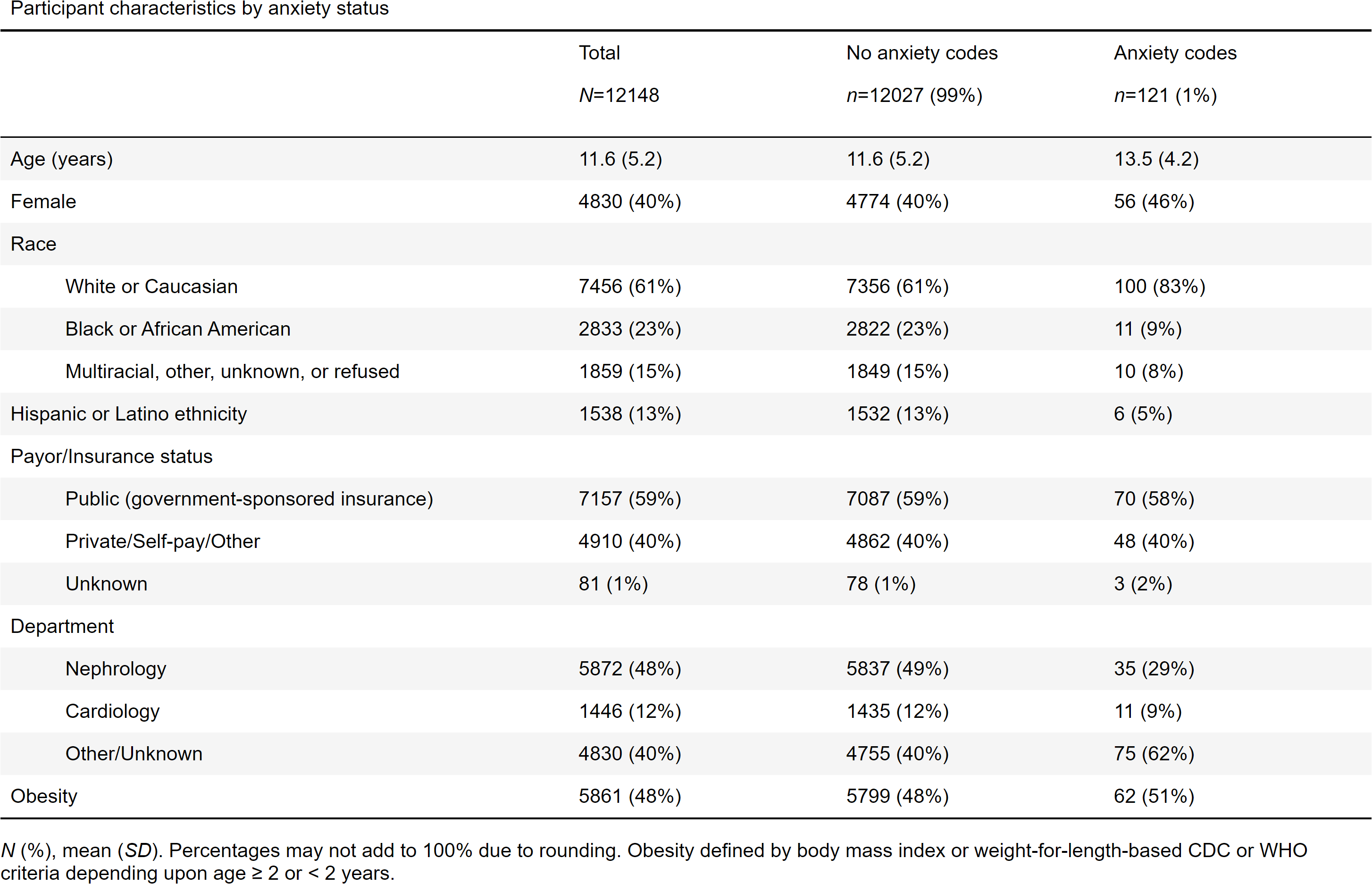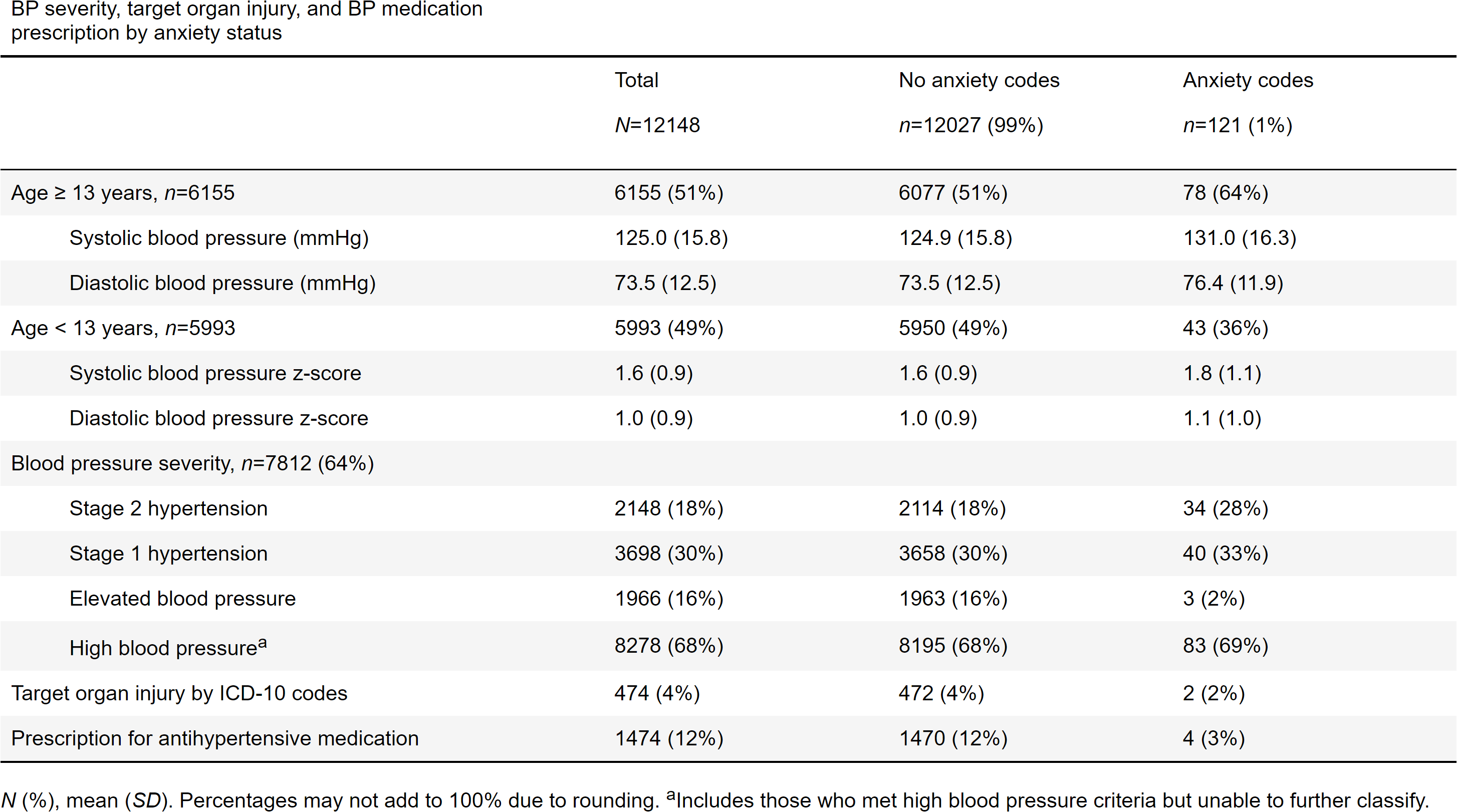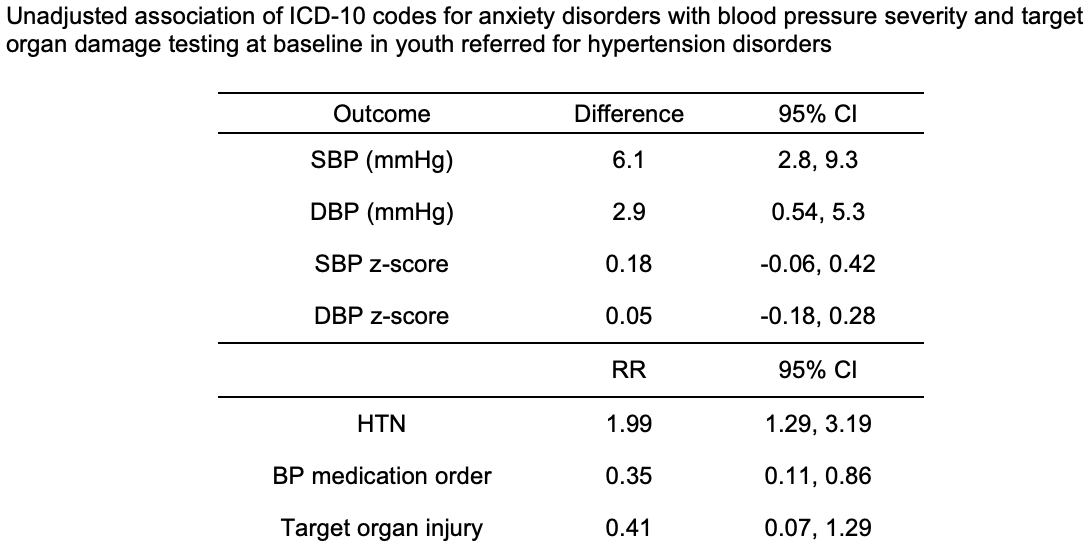Hypertension
Hypertension 1
3 - Association of Anxiety Disorders with Blood Pressure Severity, Target Organ Injury, and Hypertension Management in Youth
Sunday, April 30, 2023
3:30 PM - 6:00 PM ET
Poster Number: 3
Publication Number: 3.321
Publication Number: 3.321
Claire J. Hoffman, Wake Forest School of Medicine of Wake Forest Baptist Medical Center, Northampton, PA, United States; Shupti Biswas, Cohen Children's Medical Center, Floral Park, NY, United States; Aaron M. Bridges, Wake Forest School of Medicine of Wake Forest Baptist Medical Center, Wilkesboro, NC, United States; Lucy D'Agostino McGowan, Wake Forest University, Winston Salem, NC, United States; Victoria Giammattei, Wake Forest School of Medicine of Wake Forest Baptist Medical Center, winston-Salem, NC, United States; Margret Kamel, Emory University School of Medicine, Atlanta, GA, United States; Stefan G. Kiessling, Kentucky Children's Hospital, Lexington, KY, United States; Jackson T. Londeree, Emory, Atlanta, GA, United States; Caroline B. Lucas, Wake Forest School of Medicine of Wake Forest Baptist Medical Center, Winston-Salem, NC, United States; Jason Misurac, University of Iowa Stead Family Children's Hospital, Iowa City, IA, United States; Margaret Murphy, University of Kentucky College of Medicine, Lexington, KY, United States; Sandeep Riar, Emory University School of Medicine, Atlanta, GA, United States; Christine Sethna, Cohen Children’s Medical Center, New Hyde Park, NY, United States; Irina Viviano, Wake Forest School of Medicine of Wake Forest Baptist Medical Center, Winston-Salem, NC, United States; Donald J. Weaver, Levine Children's Hospital, Charlotte, NC, United States; Ikuyo Yamaguchi, Oklahoma Childrens Hospital at OU Health, Oklahoma city, OK, United States; Emily J. Yun, Emory SOM, Atlanta, GA, United States; Andrew M.. South, Wake Forest School of Medicine of Wake Forest Baptist Medical Center, Winston Salem, NC, United States

Claire J. Hoffman (she/her/hers)
Medical Student
Wake Forest School of Medicine of Wake Forest Baptist Medical Center
Northampton, Pennsylvania, United States
Presenting Author(s)
Background: The role of anxiety in hypertension and cardiovascular disease is not well understood in youth, unlike in adults.
Objective: This study assessed whether anxiety disorders were associated with worse blood pressure, target organ injury, and initial management at baseline in youth-onset hypertension.
Design/Methods: Interim analysis of baseline data from SUPERHERO, a multisite retrospective cohort study of youth referred for hypertension disorders using electronic health record data. Inclusion criteria were hypertension disorder by ICD-10 codes, index visit from 1/1/2015–12/31/2021, and age < 19 years. Exclusion criteria were kidney failure-dialysis, kidney transplantation, or pregnancy by ICD-10 codes. Our exposure was anxiety disorders by ICD-10 codes. Our outcomes were blood pressure severity, target organ injury by ICD-10 codes, and orders placed for antihypertensive medication prescriptions at the index visit. Associations were estimated using Welch two-sample t-test and unadjusted generalized linear models.
Results: Of 12,148 participants, mean age was 11.6 years (SD 5.2), 60% were male, 61% were White/Caucasian, 23% were Black/African American, and 48% had obesity (Table 1). 121 participants had at least one ICD-10 code for anxiety disorders. Blood pressure severity included elevated blood pressure 16%, stage 1 hypertension 30%, and stage 2 hypertension 18%. 4% had target organ injury and 12% were prescribed an antihypertensive medication. In regression analysis, participants with anxiety disorders had significantly higher risk of blood pressure in the hypertension range than those without anxiety (RR 1.99, CL 1.29–3.19) and participants with anxiety were less likely to be prescribed an antihypertensive medication than those without anxiety (RR 0.35, CL 0.11–0.86).
Conclusion(s): In a large and diverse cohort of youth with hypertension disorders, anxiety disorder diagnostic codes at the index visit were associated with worse blood pressure severity, though less likely to be prescribed antihypertensive medication. This could represent a missed treatment opportunity or potential incorrect underlying assumption of anxiety alone causing hypertension, thus not meriting treatment. It is also probable that anxiety disorders are underreported in this population and other unstudied exposures may influence these results.



